Cat Rambo's Blog, page 22
September 6, 2019
Critclub a Few Days In
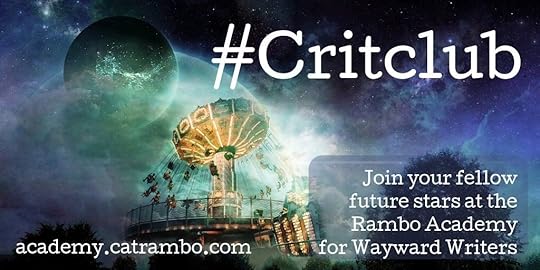 A few days ago, I implemented #Critclub, tying the Chez Rambo Discord server more tightly into the Rambo Academy for Wayward Writers and providing a way for F&SF to swap critiques online. People seem excited about this, and the Patreon campaign has seen an uptick. A few people have taken me up on the offer of scholarships – thank you!
A few days ago, I implemented #Critclub, tying the Chez Rambo Discord server more tightly into the Rambo Academy for Wayward Writers and providing a way for F&SF to swap critiques online. People seem excited about this, and the Patreon campaign has seen an uptick. A few people have taken me up on the offer of scholarships – thank you!
A nice little bump of people have appeared on the channel as a result and we’ve been doing things like sorting out how the critiquing system will work. We have added the first custom emoji, a rainbow kittywumpus 
September 4, 2019
(Guest Post) R.J. Theodore on Secondary Worlds Without Monocultures: POV, Cultural Perspective, and Worldbuilding
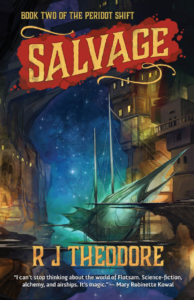 I cut my SFF teeth on Star Trek, and I credit The Next Generation as setting me on the path to becoming an SFF author. But I lament the monocultures encountered on those Starfleet missions as a missed opportunity. Monocultures may catch attention as a hook, but the believability crumbles when the reader has a lengthy stay and finds that they lack real depth.
I cut my SFF teeth on Star Trek, and I credit The Next Generation as setting me on the path to becoming an SFF author. But I lament the monocultures encountered on those Starfleet missions as a missed opportunity. Monocultures may catch attention as a hook, but the believability crumbles when the reader has a lengthy stay and finds that they lack real depth.
My favorite part of writing SFF is inviting the reader to explore new worlds with unearthly mechanics, magic systems, or zoology that entrance the imagination. But what imprints a story on the reader’s soul is the ability to relate to the experience. The real world contains multitudinous experiences, cultures, and viewpoints. It’s important to reflect that in our stories, even if we are zooming in on a more intimate story.
Avoiding monoculture by creating characters who have different experiences makes a story feel vibrant, more faithful, and realistic. When those characters interact, it adds conflict, tension, and opportunities to create real magic.
Building this kind of depth is not hard! It just takes more of the thoughtful and intentional world-building the author is already engaged in. It doesn’t limit the author’s imagination, it gives it more opportunity.
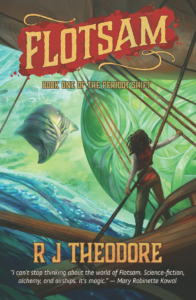 The first book in my Peridot Shift series is told via my airship captain and ne’er-do-well, Talis. While choosing one POV tightened up the story considerably from earlier drafts where multiple characters took center stage, it was incredibly frustrating to describe the entirety of Peridot through the lens of Talis’s biases. Even as her worldview expands through the events of the story, there’s so much she still doesn’t know she doesn’t know. I was mindful of knocking her down a notch every so often, clearing the viewport of her fog so the reader could get a better view beyond it, but still, there was so much work to be done.
The first book in my Peridot Shift series is told via my airship captain and ne’er-do-well, Talis. While choosing one POV tightened up the story considerably from earlier drafts where multiple characters took center stage, it was incredibly frustrating to describe the entirety of Peridot through the lens of Talis’s biases. Even as her worldview expands through the events of the story, there’s so much she still doesn’t know she doesn’t know. I was mindful of knocking her down a notch every so often, clearing the viewport of her fog so the reader could get a better view beyond it, but still, there was so much work to be done.
When it came time to write the sequel, SALVAGE’s editor, Ryan Kelley, immediately identified that there were other crucial stories here to tell. I approached a massive revision with giddy excitement. My editor had said those magic words every author dreams of hearing: More story. Here was the chance to expand the depth of my world by featuring the other denizens of Peridot!
Talis and her crew are still central to the story, but they begin in a subterranean Rakkar city where their plot to make a triumphant return to the life they knew leaves them far from bigger machinations that are turning. Machinations that threaten consequences for more than just a rag-tag crew of smugglers.
Additional POV characters let me open the map on the world I’d created. To show more cultures, and more viewpoints, including differing positions within a single culture.
Instead of waiting for book three to shatter the stereotype Talis presented of the Vein as a race of blind seers from book one, I got to give a person, Zeela, center stage moments in book two. She observes diabolical happenings and the path to become part of Talis’s crew is clarified, but Zeela also gets to smash the mystique of her people’s uncanny observations by revealing their use of secret, high-tech assistive devices. To normalize and personalize what seems strange and unnatural to someone who doesn’t share that viewpoint.
At the opposite end of the Cutter social spectrum, we follow the twisted thoughts of Hankirk, as well as the selfless aspirations of a young empress. Both people are the same race as Talis, but they live entirely different experiences and show us different ways of seeing the subtler moments of a grand story.
SALVAGE also puts the spotlight on High Priestess Illiya, a Bone priestess struggling to comfort and protect her congregation after their goddess is made mortal. In FLOTSAM, Talis introduces Illiya as more cutthroat and sinister than a pirate. Don’t get me wrong, she is! But in SALVAGE, we also get to learn of her pride, her empathy, and her anxiety.
Every character lives their own life, and each life builds more volume into what it means to be a part of Peridot.
Filling our secondary worlds with multiple cultures and viewpoints reminds us to look outside of our own experiences in the real world, to look past our first impressions so we can understand more about each other. Maybe as we go on a grand adventure to impossible realms, we also learn to see each other, here on Earth, as characters each in our own story whose viewpoints are as worthy as our own.
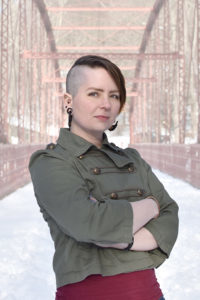 About the Author
About the Author
R J THEODORE (website) is hellbent on keeping herself busy. No, really, if she has two minutes to rub together at the end of the day, she invents a new project with which to occupy them.
She enjoys reading, design, illustration, video games (she will take you down in Super Puzzle Fighter II Turbo), binging on movies and streaming series, napping with her cats, and cooking. She is passionate about art and coffee.
R J Theodore lives in New England with her family. With Kaelyn Considine of Parvus Press, she co-hosts bi-weekly episodes of the We Make Books Podcast (wmbcast.com).
In 2018, Theodore made her publishing debut with her self-published novella THE BANTAM, and her novel FLOTSAM, Book One of the Peridot Shift series, published by Parvus Press. Book Two of the Peridot Shift series (Parvus Press), SALVAGE is now available in print and digital.
Follow Theodore’s writing process, find her on social media, and subscribe to her newsletter at rjtheodore.com.
Enjoy this writing advice and want more content like it? Check out the online classes from the Rambo Academy for Wayward Writers, which offers both on-demand and live online writing classes for fantasy and science fiction writers from Cat and other authors, including Ann Leckie, Seanan McGuire, Fran Wilde and other talents! All classes include three free slots.
If you’re an author or other fantasy and science fiction creative, and want to do a guest blog post, please check out the guest blog post guidelines.
Presenting #CritClub
I’m pleased to announce that the Rambo Academy for Wayward Writers is once again expanding its offerings.
The first of the most recent expansions answers a question that writers have expressed to me over and over again in workshops, on panels, in e-mail and one-on-one conversations, including several of the mentoring sessions I did last weekend at DragonCon:
How do I find a writing group of other fantasy and science fiction writers so I can trade critiques?
I’ve got an answer now that I feel 100% happy with: the Rambo Academy for Wayward Writers #Critclub.

#CritClub is an online space where fantasy and science fiction writers of all levels can exchange story and novel critiques. Its Discord server provides chat rooms where members can trade critiques as well as discuss market news, tips, and trends, recent rejections, and supportive advice and feedback.
Ways to sign up for #Critclub:
Do you support me on Patreon at the $2 or more level? Then you’re already signed up and should be able to access the Discord server.
Are you already a member on the Chez Rambo server? Like the Patreon supporters, your access is already there. Thanks for being part of the community!
Subscribe using one of the buttons below for $5 per month or $50 per year. After you subscribe, you will receive acknowledgement and an invitation to the Discord server within 24 hours.
Can’t afford it? I understand that these expenses add up. As with the classes, I’ve got plenty of free slots available, with the only criteria being that you think it would be useful to you as a writer but can’t afford it. I particularly encourage you to apply if you’re a writer of color, QUILTBAG, a person with disabilities, or are otherwise othered. We want you as part of the community. There is no obligation to participate in the critiquing portion.
How the Critclub Critique System Works
Members receive 3 credits when they sign up; everyone currently participating has 3 as well.
The cost of putting a story up for critique is:
1 credit for a story up to 7500
If the piece is longer, 1 additional credit for every 5000 words above that
You earn credits at the same rate. Credits are non-transferable.
Initially this will run on the honor system; if need be, we’ll add something more formal. Tips and formatting for critiquing are here, but as a rule of thumb, critiques should be at least 250 words (ish) and address developmental issues rather than line edits (unless the author requests otherwise).
Additional Rambo Academy for Wayward Writers Community Benefits
Each week, channel #thepanel will feature discussion centered on a specific topic, sometimes with guest moderators to lead discussion. September’s topics are: Week 1: Conventional Talk (Whether Conventions are worthwhile and how to make the most of them), Week 2: The Coaxing, Care, and Feeding of Story Ideas, Week 3: The Fine Art of Rejectomancy, or How to Use Rejections to Get Better, and Week 4: What’s the Slush Pile Like?
Channels include Rejectomancy for discussing submissions, Motivation, Market News and Book Club for discussing recent reading, among others.
Payment Options
Monthly : $5.00 USD – monthlyYearly : $60.00 USD – monthly

August 27, 2019
Poem for Sarah
 Some deaths hit you
Some deaths hit you
like a broken bone.
That sharp. That painful.
They stick with you, hurting even when healing,
a dull throb keeping
you from sleeping;
a startled, knifeslash pang when jostled.
And you know that, decades later,
it’ll still be that ache, that pain,
that returns whenever you are standing
by yourself in the melancholy rain.
For Sarah Bird, 3/5/48-8/25/19, with all my love
August 26, 2019
Where I’ll Be: Multiverse Con 2019
 I’m the Industry Guest of Honor at the inaugural Multiverse, an Atlanta-based fan-focused convention celebrating science fiction & fantasy in all media, this October. The other guests of honor are Seanan McGuire and John Picacio, and the full list of attendees is here and includes the awesome Roshani Chokshi, Milton Davis, Meg Elieson, John Hartness, Chris Jackson, Catherine Lundoff, Misty Massey, Lee Martindale, Chris Morgan, and Sheree Renee Thomas — and many more!
I’m the Industry Guest of Honor at the inaugural Multiverse, an Atlanta-based fan-focused convention celebrating science fiction & fantasy in all media, this October. The other guests of honor are Seanan McGuire and John Picacio, and the full list of attendees is here and includes the awesome Roshani Chokshi, Milton Davis, Meg Elieson, John Hartness, Chris Jackson, Catherine Lundoff, Misty Massey, Lee Martindale, Chris Morgan, and Sheree Renee Thomas — and many more!
Here’s my schedule.
Friday October 18, 2019
1:00 pm 2:00 pm Opening Ceremonies GATHER BC
(Chattahoochee BC)
2:30 pm 3:30 pm Ageism in Fantasy GEEK: Fantasy (Harding) (moderator)
4:00 pm 5:00 pm How I Learned to Stop Worrying and Love Podcasting GEEK: SciFi (Rabun)
5:30 pm 6:30 pm An Hour with Cat Rambo GATHER A
(Chattahoochee A)
Saturday October 19, 2019
11:30 am 12:30 pm Story Quickies: Made Up Slide Presentations MEET (Savannah A)
1:00 pm 2:00 pm Social Media for Writers WRITE (Sinclair) (moderator)
4:00 pm 5:00 pm Be Like Killjoys: Mapmaking in SpecFic (YA) GEEK: SciFi (Rabun) (moderator)
8:30 pm 9:30 pm Rathskellar Readings WRITE (Sinclair)
Sunday October 20, 2019
10:00 am 11:00 am LGTBQ+ in Fandom GATHER A
(Chattahoochee A)
11:30 am 12:30 pm The Many-Faced God: Unraveling Sub-Genres in Fantasy GEEK: Fantasy (Harding) (moderator)
2:30 pm 3:30 pm Part of the Pack: Horror under the Speculative Fiction Umbrella GEEK: Horror (Ogeechee) (moderator)
August 22, 2019
Market Call: Zombies Need Brains Needs Stories
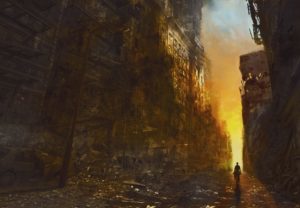 Let me introduce myself. I’m Joshua Palmatier, a fantasy author with DAW Books, but also the founder of the small press Zombies Need Brains (considered a professional market by SFWA). We publish SF&F themed anthologies, using Kickstarters to generate the funds needed to produce the books. We have a Kickstarter running right now. If you have a moment, click on through, check it out, and back! For the basic levels, you’re essentially just preordering the books (at a cheaper rate than they’ll be once released to the public).
Let me introduce myself. I’m Joshua Palmatier, a fantasy author with DAW Books, but also the founder of the small press Zombies Need Brains (considered a professional market by SFWA). We publish SF&F themed anthologies, using Kickstarters to generate the funds needed to produce the books. We have a Kickstarter running right now. If you have a moment, click on through, check it out, and back! For the basic levels, you’re essentially just preordering the books (at a cheaper rate than they’ll be once released to the public).
But that’s not the point of this post. I’m here because one of the features of Zombies Need Brains publishing is that I believe in finding new voices in the SF&F field. To do that, I run open calls for submissions for each of our anthologies. Cat invited me here so I could introduce the three new themes for this Kickstarter and to encourage all of you to brainstorm, write, revise, polish, and submit a story. The call will open as soon as the Kickstarter funds and will last until December 31st, 2019. Decisions on stories are generally made by February the following year, with the anthologies coming out sometime before August. You can find more details at the Kickstarter if you’d like, and there will be a much more detailed set of guidelines issued once the Kickstarter funds.
“But what are the themes?!?” I hear you asking. We have three anthologies, dealing with apocalypses, food, and old tech finding new life. Here are some brief descriptions:
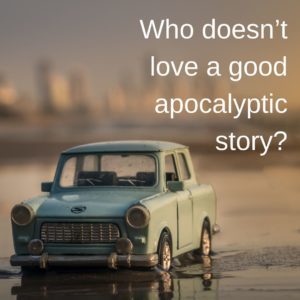 APOCALYPTIC: Who doesn’t love a good apocalyptic story? They come in all kinds, from the straight up SF/horror of Stephen King’s superflu in “The Stand” and the zombie apocalypse in “The Walking Dead,” to the quieter, more reflective tales of loss and survival in “On the Beach” and “Childhood’s End.” Tales that feature people struggling through the end of the world–or fighting to survive in what remains–are always compelling. What better way for readers to safely explore the extremes of the human condition without actually having to fight off the ravening hordes themselves? For this anthology, we’ll be looking for unique takes on how the world ends, both during and after the apocalypse. So bring on your asteroids, your plagues, your solar flares! And ask yourself, would you survive the apocalypse? Would you even want to?
APOCALYPTIC: Who doesn’t love a good apocalyptic story? They come in all kinds, from the straight up SF/horror of Stephen King’s superflu in “The Stand” and the zombie apocalypse in “The Walking Dead,” to the quieter, more reflective tales of loss and survival in “On the Beach” and “Childhood’s End.” Tales that feature people struggling through the end of the world–or fighting to survive in what remains–are always compelling. What better way for readers to safely explore the extremes of the human condition without actually having to fight off the ravening hordes themselves? For this anthology, we’ll be looking for unique takes on how the world ends, both during and after the apocalypse. So bring on your asteroids, your plagues, your solar flares! And ask yourself, would you survive the apocalypse? Would you even want to?
GALACTIC STEW: Food is an essential part of life—not just for energy and exotic flavors, but as a unifier during social events, a focal point for establishing culture, and shared experience to put people at ease. In GALACTIC STEW, readers will sit down at the communal table and sup upon stories centered on food. Whether it’s a tense treaty negotiation over a full course meal or a trap devised by the fae to chain you to their realm, these stories are certain to be delectable. Come and savor these delicacies…and hope the taste doesn’t mask a deadly poison!
MY BATTERY IS LOW AND IT IS GETTING DARK: When NASA’s Opportunity rover sent its last message from Mars–loosely translated by scientists as “my battery is low and it is getting dark”–many of us paused in a shared moment of sadness and gratitude, aimed at a robot left alone on a faraway planet. That moment inspired this anthology. We want stories about technology that has operated long past its time, but we want to give these lost spirits new life, whether it be rescue, a new purpose, a new beginning, or a simple homecoming. What happens to the robots and rovers and AIs and more after their original purpose has faded? What is the next chapter of their story?
Those are our themes. We accept stories up to 7500 words, including flash fiction, although I’ll warn you that we’re looking for fully developed stories, so pieces shorter than 2500 are rarely accepted. Our average length is probably around 6000. So brainstorm and find a cool idea, but then take the time to develop a full character arc around that cool idea.
Again, the open call will start as soon as the Kickstarter funds, so keep watch for that at tinyurl.com/ZNBApocalypse and for the more detailed guidelines for submissions once that happens, including where to send the stories, formatting, etc. This post is just a heads up so that you can start thinking and planning.
Good luck!
 And thanks again to Cat to letting me guest blog here today!
And thanks again to Cat to letting me guest blog here today!
August 21, 2019
The Future is Queer: 11 LGBT+ Contemporary Authors Writing Speculative Fiction That You Should Know
 From Octavia Butler, author of multiple Nebula- and Hugo-award-winning novels, to longtime Star Trek scriptwriter David Gerrold, LGBT+ creators have long played a major part in steering the direction of speculative fiction. And the canon has never been more diverse and fascinating than now, with authors from a wonderfully wide range of backgrounds and experiences.
From Octavia Butler, author of multiple Nebula- and Hugo-award-winning novels, to longtime Star Trek scriptwriter David Gerrold, LGBT+ creators have long played a major part in steering the direction of speculative fiction. And the canon has never been more diverse and fascinating than now, with authors from a wonderfully wide range of backgrounds and experiences.
In this post we want to particularly spotlight all the contemporary LGBT+ writers of speculative fiction who are bringing their own perspective to science fiction and fantasy. Whether it’s semi-autobiographical surrealism or a unique, intricately imagined other world, you’re sure to find something on this list that piques your interest. Perhaps you’ll even discover a new favorite author, or one who motivates you to write your own book!
So without further ado, here they are, for your enjoyment and inspiration: 11 LGBTQIA authors of contemporary spec fic that you should know.
1. Michelle Ruiz Keil (author of All of Us with Wings)
Keil just exploded onto the scene with the June release of her YA fantasy debut, All of Us with Wings. This elegantly crafted novel follows seventeen-year-old governess Xochi — who, like Keil, is bisexual and Latinx — after she and her young charge accidentally summon a pair of vengeful demons to attack people from Xochi’s past. If you’re looking for an own voice LGBT author whose stories involve fantastical elements, yet still feel incredibly down-to-earth and authentic, Keil is definitely one to add to your list. “My favorite books make me feel seen and known and accompanied… less alone,” she noted in a recent interview with mitú. “My deepest hope is that is that All of Us with Wings will be that kind of company for its readers.”
2. Malinda Lo (author of Adaptation)
Like your reads dark, dystopian, and with a distinctly sophisticated voice? Lo and behold (no pun intended), you’ve found your literary champion. Malinda Lo, a Chinese-American author with several speculative fiction books under her belt, has also written for LGBT culture site AfterEllen and helped co-found Diversity in YA. (Talk about a woman of many talents!) After the success of her first novel, a queer retelling of Cinderella, Lo went on to write the sci-fi/thriller series Adaptation, which centers on a young woman named Reese as she attempts to make sense of the world in the wake of an unprecedented natural disaster — discovering herself in the process.
3. Alex London (author of Proxy)
Though Alex London has been around for a while, he’s often published under the slightly altered pseudonym of C. Alexander London, so you may not be sure exactly who he is. Rest assured, however, that his brilliance remains intact no matter what name he’s using. London’s first series, Proxy, boasts one of the most intriguing speculative premises we’ve heard in recent years: in a post-apocalyptic society, the 1% are punished for their misdeeds by being forced to watch a proportionate sentence carried out on a proxy, or a poor person who subs in for them. But when rich boy Knox and his lower-class proxy Syd (who happens to be gay) disrupt the system, the results are both revolutionary and shockingly unpredictable — a truly impressive feat in the oversaturated dystopian YA market.
4. J.Y. Yang (author of The Black Tides of Heaven)
Yang, a queer and non-binary author, specializes in “silkpunk,” which draws inspiration from real-life East Asian culture and history. Their first book, The Black Tides of Heaven, kicks off with a pair of twins — Akeha and Mokoya — coming into their supernatural abilities. Mokoya is gifted with prophetic vision, but Akeha’s talents are a bit more slippery: he sees not just what will happen, but what could happen. This leads him to align himself with the rebellion against his government… and against Mokoya, who serves it. Throughout the story, Yang demonstrates an incredible knack for characterization even in the midst of complex worldbuilding, and their full Tensorate series (which starts with Black Tides) only affirms their perfectly balanced technique.
5. Claudie Arseneault (author of City of Strife)
Arseneault’s niche is aromantic and asexual characters, reflective of her own underrepresented experience as an aro/ace woman. In City of Strife, many of the characters are explicitly asexual and aromantic, with the narrative emphasizing and celebrating their close platonic friendships. However, this is by no means the focal point of the story, which is an elaborate political fantasy about a city crumbling under the weight of various power struggles. In terms of social issues, City of Strife and its sequels deftly address everything from labor practices to racial profiling. However, Arseneault’s inclusion of ace/aro characters (and her provision of resources for readers and authors hoping to learn more) make her a sublime role model for the “A” segment of the LGBTQIA community.
6. Akwaeke Emezi (author of Freshwater)
Emezi, whose widely acclaimed debut Freshwater came out last year, says that they wrote it “specifically for people who are inhabiting marginalized realities” — in terms of more than just gender/sexuality, but on a mental, spiritual, and overall experiential level. After reading a few pages of Freshwater, one cannot deny that this has been impeccably accomplished, as the story about a young woman battling dysphoria, trauma, and her (literal) inner demons is like nothing you’ve ever read before.
A particularly interesting aspect of Emezi’s work is their use of POV: Freshwater is narrated by the ogbanje, or malevolent spirits, that haunt the consciousness of the main character Ada. The ogbanje refer to themselves as “we” and Ada as “she,” a nod to how marginalized/isolated people often feel that their lives are out of their control — which Emezi drew from their own experience, and which many others will surely relate to as well.
7. Carmen Maria Machado (author of Her Body and Other Parties)
Already a well-known name in literary circles, Machado published Her Body and Other Parties in 2017: a masterful fusion of science fiction, psychological thriller, horror, and weird fantasy that elevated her to speculative fiction royalty. This anthology will target all of your most primal and abstract fears, including a blood-curdling retelling of the infamous “green ribbon” ghost story, the tale of a woman whose obsession with her weight that has very unintended consequences, and a surreal series of Law and Order episodes with phantasmagorical horror elements inserted. The common thread here is the objectification and subjugation of women, which Machado presents as both universal and particular, especially through the unique lens of queerness.
8. Kameron Hurley (author of The Mirror Empire)
Even darker than Machado’s work is Hurley’s Mirror Empire, a bloody, carnal, grimdark (no hopepunk here) work of fantasy that’s not exactly palatable, but still incredibly engrossing. Why? Because Hurley turns established tropes on their heads to create a groundbreaking new world. In this book, not only are women leaders and warriors, they far outnumber their male counterparts. You could call it a matriarchy, but even that’s not a strong enough word. The women utterly dominate the males, using them as slaves and sexual objects… which can be disturbing at times, but given the profusion of the reverse dynamic in fantasy, is also quite bracing. Of course, Mirror Empire cannot and should not be read uncritically (that’s the point of having morally gray characters), but Hurley’s done a stand-up job of creating a totally radical world that will especially appeal to GoT-weary female fantasy readers.
9. C.M. Spivey (author of From Under the Mountain)
Continuing in a similar vein, C.M. Spivey’s From Under the Mountain is another excellent recent addition to the high fantasy canon. It revolves around nineteen-year-old Guerline, who is thrust into the role of empress before she’s even got to grips with her non-royal identity… and how she feels about her lower-class companion, Eva. But personal matters are soon eclipsed when an ancient mystical evil rears its ugly head, and Guerline alone must decide how to proceed.
Spivey himself is a longtime writer of speculative fiction, and as a panromantic asexual trans man, he is “committed to queering his favorite genres” (according to his bio) — which clearly comes across in the unconventional fantasy novel that is From Under the Mountain.
10. Noelle Stevenson (author of Nimona)
You might know Stevenson from her work on Lumberjanes and the super-cool She-Ra reboot, but did you know she also wrote and illustrated the fantasy webcomic-turned-graphic-novel Nimona? For those who didn’t, a quick synopsis: Nimona is a spirited young shapeshifter who serves as a supervillain’s sidekick. But as the story unfolds, we see that Nimona and her boss, the knight/mad scientist Lord Ballister Blackheart, are not all they seem — and that their purportedly “good” nemeses are hiding something. Indeed, much of Stevenson’s work involves deconstructing shallow first impressions and creating fully three-dimensional characters in their wake, breathing life into them with her artwork.
11. Larissa Lai (author of The Tiger Flu)
Rounding off our list at #11 is Larissa Lai, whose 2018 sci-fi novel The Tiger Flu was her first in 16 years! The women of this story are parthenogenic, meaning they can reproduce asexually, without men; however, they do suffer from chronic organ failure, which means they depend on a “starfish” among them to donate and then regenerate her various body parts. And when this starfish woman dies of the titular flu, her lover Kirilow has no time to grieve — she must venture into a fully infected city to find another starfish, so she and her sisters will not die. A thoroughly original, unadulteratedly feminist work of speculative fiction, The Tiger Flu has been described by Lai as a definite challenge to her writing, but praised by critics as her best work yet.
 This guest post is from Savannah Cordova, a writer with Reedsy, a marketplace that connects authors and publishers with the world’s best editors, designers, and marketers. She’s very interested in content marketing trends and hacks for creators. In her spare time, Savannah enjoys reading contemporary fiction and writing short stories.”
This guest post is from Savannah Cordova, a writer with Reedsy, a marketplace that connects authors and publishers with the world’s best editors, designers, and marketers. She’s very interested in content marketing trends and hacks for creators. In her spare time, Savannah enjoys reading contemporary fiction and writing short stories.”
#SFWAAUTHORS
August 6, 2019
Interview with Richard Kadrey
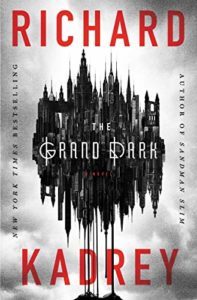 Recently I reviewed Richard Kadrey’s The Grand Dark for Green Man Review. I enjoyed the book and kept thinking about it, so I had some questions. Richard kindly agreed to a follow-up interview. Here’s his answers to those questions.
Recently I reviewed Richard Kadrey’s The Grand Dark for Green Man Review. I enjoyed the book and kept thinking about it, so I had some questions. Richard kindly agreed to a follow-up interview. Here’s his answers to those questions.
Q: What was it about the setting of The Grand Dark that drew you? It feels as though it came first and then the story within it – or was it the other way around?
RK: All of my previous work had been set in real places, primarily Los Angeles and San Francisco. With The Grand Dark, I wanted to build my own world from the ground up. The character of Largo appeared pretty much at the same time as I was creating the city of Lower Proszawa in my mind. I wanted someone somewhat innocent and with very little power to contrast with the weight and complexity of the city. But he had to be fluent in the streets. Largo could have been a crook, but instead I made him a bicycle messenger. Someone at the mercy of the weather, the traffic, and moody cops.
Q: What fears did you have about moving away from Sandman Slim and into different waters?
RK: I was very nervous. Largo was the opposite of my best-known characters, especially James Stark, aka Sandman Slim. Stark is confident and powerful. Largo is just the opposite. His defining characteristic is the constant fear he lives with because of his brutal childhood. But Largo isn’t a wimp. He finds his strength as the book progresses. Stark, and even Coop in my caper novels, were already strong and didn’t need a lot of lessons. People associated me with that kind of character and I got some pushback at first. But now that the book is out, readers seem to be coming around to Largo and the tough time I give him in The Grand Dark.
Q: Some critics have said that speculative fiction, no matter what time period it’s set in, is about the times in which it’s being produced. Do you think that’s true of The Grand Dark, and why or why not?
RK: Trust me, this book wouldn’t have been nearly as dark if I’d written it at a different time and under a different president. We’re seeing the rise of a cruel, fascist ethos around the country. For me, it feels as if we’re hurtling toward some kind of great calamity, which is what’s happening to Lower Proszawa in the book.
Q: Does having written for comics shaped your novel writing process? Do you have a vision for a graphic novel version of The Grand Dark?
RK: I’ve always been a visual writer, so comics were a natural extension for me. Writing both comic and, now, film scripts has helped me break down stories to their basic components and put them back together again, scene by scene.
Q: What’s coming up next for you?
RK: I’m working on a new Sandman Slim novel and I’ve finished up a new film script that I really can’t talk about right now. I also have some comic proposals out. Because I’m also a photographer, probably the strangest thing I’d like to do is a photo tour of burial sites around the world, and then put them together in a book with a story about each place.
August 3, 2019
Where I’ll Be: DragonCon 2019
 Title: 15-Minute Mentor Session
Title: 15-Minute Mentor Session
Description: A chance for budding authors to talk one-on-one with a successful industry professional about business, promotion, the writing process, & career advice. Sign up in the Writer’s Track. (Embassy C-D)
Time: Fri 04:00 pm Location: Embassy G – Hyatt (Length: 1 Hour)
(Tentative Panelists: Cat Rambo, D.J. Butler, Toni Weisskopf)
——————-
Title: Her-storically Speaking: Meet the Women of War
Description: History books would have you believe that men did all the fighting while women kept the home life thriving. But those history books are wrong. Join us as we peel back the layers of fiction and reality and talk about both real and imagined women of warfare.
Time: Fri 07:00 pm Location: Macon – Sheraton (Length: 1 Hour)
Moderator / MC for panel
(Tentative Panelists: Tamsin L. Silver, Tina Glasneck, Cat Rambo)
——————-
Title: 15-Minute Mentor Session
Description: A chance for budding authors to talk one-on-one with a successful industry professional about business, promotion, the writing process, & career advice. Sign up in the Writer’s Track. (Embassy C-D)
Time: Sat 04:00 pm Location: Embassy G – Hyatt (Length: 1 Hour)
(Tentative Panelists: S.M. Stirling, Cat Rambo, Keith R.A. DeCandido, Anne Sowards)
——————-
Title: Her-storically Speaking: The Lost Women Of History
Description: Well-behaved women rarely make history, as they say. We’ll talk about some of the women who made waves, with their resourcefulness, ambition and a rebellious nature. History professors, writers, and all-around smart ladies talk about the stories we may not have been taught in history books.
Time: Sat 08:30 pm Location: Macon – Sheraton (Length: 1 Hour)
Moderator / MC for panel
(Tentative Panelists: Cat Rambo, Amanda DeWees, Leanna Renee Hieber, Esther Friesner)
——————-
Title: Courtesans, Mistresses & Madams: History’s Most Famous Working Women
Description: History has a lot of unsung heroes, specifically in this profession. Contrary to what you may have read, some of the most notorious and celebrated madams and ladies of ill repute have shaped and often guided our history. This survey panel showcases some you should know about.
Time: Sat 10:00 pm Location: Macon – Sheraton (Length: 1 Hour)
Moderator / MC for panel
(Tentative Panelists: Cat Rambo, Gail Z. Martin, Cecilia Dominic, Jean Marie Ward)
——————-
Title: Reading Session: Cat Rambo
Time: Sun 11:30 am Location: Vinings – Hyatt (Length: 1 Hour)
(Tentative Panelists: Cat Rambo)
——————-
Title: Dragon Awards Ceremonies
Description: Presentation of the 2019 Dragon Awards in 15 categories! Who will you choose as the fan favorites this year? Come & find out the results!
Time: Sun 05:30 pm Location: Centennial I – Hyatt (Length: 1 Hour)
(Tentative Panelists: Dr. Charles E. Gannon, Tim Powers, George Pérez, Mike Capps, Cat Rambo, Larry Niven, Brandon Sanderson, Katherine Kurtz, Chelsea Quinn Yarbro, Peter David)
——————-
Title: All the Subs
Description: Fantasy is filled with all kinds of stories, but sometimes a trend pops up that turns into a sub-genre. Supervise? Gamelit? LitRPG? Cozy? Noir? There are so many, & a few that don’t really fit in any…yet.
Time: Mon 01:00 pm Location: Embassy EF – Hyatt (Length: 1 Hour)
Moderator / MC for panel
(Tentative Panelists: L. Jagi Lamplighter, James A. Hunter, Aaron Crash, G. Scott Huggins, Cat Rambo, K. M. Herkes)
Where will I be most of the rest of the time? I’ll be hanging out at the Bards Tower in the dealers room – come say hi and buy a book!
July 22, 2019
Where I’ll Be: Confluence 2019
Friday 7 pm: Opening Ceremonies [Ballroom]
Participants: Tobias Buckell, Michael Longcor, Cat Rambo, Kevin Hayes (M)
Saturday 10 am to noon: Writers Workshop for 10
Participants: Cat Rambo
Saturday 2 pm: Beginnings and Endings [Commonwealth East] (moderator)
Participants: Cat Rambo (M), Tamora Pierce, Frederic Durbin
Saturday 4 pm: What Was Your Craziest Story Idea, and How Did That Work Out for You? [Commonwealth East]
Participants: Tim Esaias (M), Brenda Clough, Cat Rambo, R.K. Thorne
Sunday 10 am to 1 pm: Writers Workshop for 9
Participants: Cat Rambo




